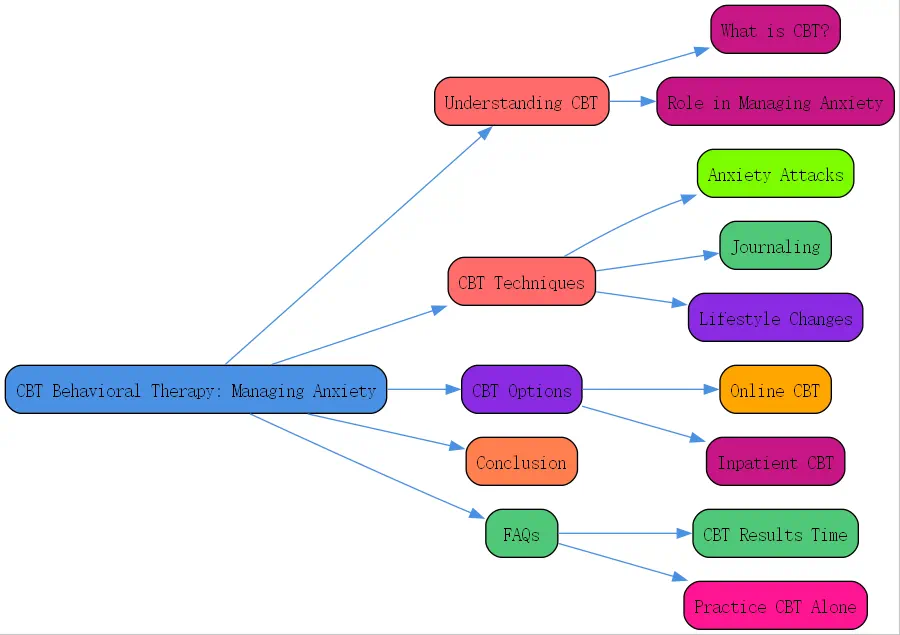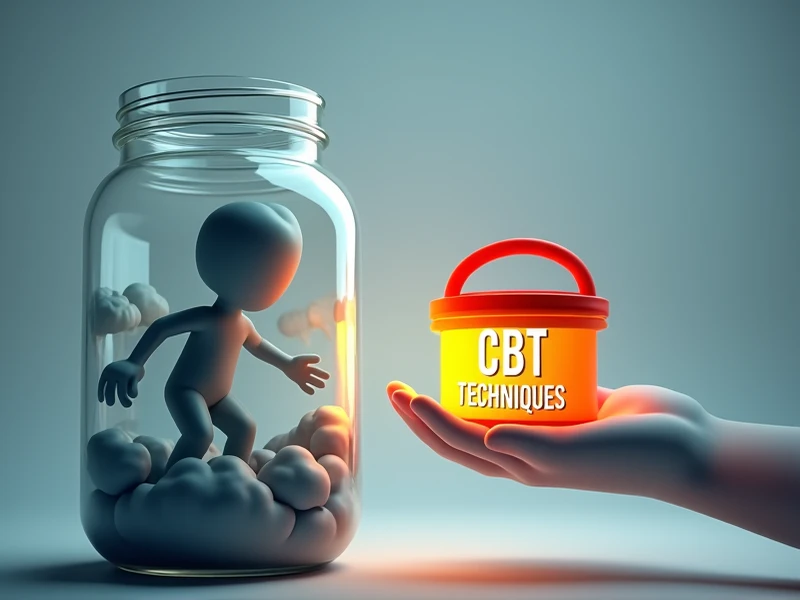Understanding Behavioral Therapy CBT

Anxiety can be an overwhelming experience, affecting millions of people worldwide. Whether you’re dealing with occasional anxiety or diagnosed with an anxiety disorder, cognitive behavioral therapy (CBT) offers effective strategies for managing these challenging feelings. As a leading approach in modern psychology, behavioral therapy CBT has helped countless individuals regain control over their thoughts and emotions.
What is CBT Cognitive Behavioral Therapy?
CBT cognitive behavioral therapy is a structured, evidence-based psychological treatment that focuses on identifying and changing negative thought patterns and behaviors. This therapeutic approach operates on the principle that our thoughts, feelings, and behaviors are interconnected, and by addressing distorted thinking, we can improve emotional regulation and develop healthier behavioral responses.
At its core, cognitive behavioral therapy CBT helps individuals recognize the negative thought patterns that fuel their anxiety. These patterns often involve catastrophizing (assuming the worst will happen), overgeneralizing (applying one negative experience to all similar situations), or mind-reading (assuming you know what others are thinking about you). By identifying these cognitive distortions, CBT provides tools to challenge and reframe them into more balanced, realistic perspectives.
Unlike some therapeutic approaches that focus primarily on past experiences, CBT behavioral therapy is present-focused and solution-oriented. It emphasizes practical skills that you can apply in your daily life to break the cycle of anxiety. This pragmatic approach makes it one of the most effective and widely-used therapies for anxiety disorders.
The Role of CBT in Managing Anxiety
When it comes to anxiety management, cognitive behavioral therapy CBT online or in-person sessions can be transformative. CBT works as a specialized talk therapy that addresses the root causes of anxiety disorders by targeting the thoughts and behaviors that maintain them.
Research consistently shows that CBT is highly effective for various anxiety disorders, including generalized anxiety disorder, social anxiety, panic disorder, and specific phobias. Through CBT, individuals learn to recognize anxiety triggers and develop healthier responses to them. This approach helps break the cycle where anxious thoughts lead to physical symptoms, which then reinforce more anxious thoughts.
One of the most valuable aspects of CBT behavioral therapy is its focus on developing practical coping mechanisms. These strategies include cognitive restructuring (challenging negative thoughts), behavioral experiments (testing the validity of anxious predictions), and exposure techniques (gradually facing feared situations). These tools empower individuals to manage their anxiety independently, even after formal therapy has ended.
For those experiencing depression alongside anxiety, depression therapy that incorporates CBT principles can be particularly beneficial, addressing both conditions simultaneously.
Practical CBT Techniques for Anxiety Management
Understanding the theory behind behavioral therapy CBT is important, but putting these concepts into practice is where real change occurs. Let’s explore some effective CBT strategies that can help manage anxiety in everyday life.
CBT Strategies for Anxiety Attacks
When anxiety attacks strike, they can feel overwhelming and uncontrollable. However, CBT cognitive behavioral therapy provides specific techniques that can help you regain control. These strategies work by interrupting the cycle of anxious thoughts and physical symptoms that characterize anxiety attacks.
Deep breathing exercises form a cornerstone of anxiety management in CBT. When you feel anxiety approaching, pause and take several slow, deep breaths. Focus on extending your exhale, which activates your parasympathetic nervous system (the “”rest and digest”” response). This simple practice can significantly reduce the physical symptoms of anxiety, such as rapid heartbeat and shortness of breath.
Mindfulness techniques, another key component of behavioral therapy CBT, involve bringing your attention to the present moment without judgment. During an anxiety attack, your mind may be racing with worries about the past or future. Mindfulness helps anchor you to the present, reducing the power of anxious thoughts. Try focusing on your five senses—what you can see, hear, feel, smell, and taste in your immediate environment.
Affirmations are another powerful CBT tool for rewiring anxious thinking patterns. These positive belief statements, typically beginning with “”I am,”” can physically reshape neural pathways when practiced regularly. Examples include “”I am capable of handling this situation”” or “”I am in control of my responses.”” Setting aside a few minutes daily to repeat meaningful affirmations can build resilience against anxiety over time.

Integrating Journaling with CBT
Journaling is a powerful complement to cognitive behavioral therapy CBT online or in-person treatment. This practice creates a tangible record of your thoughts, feelings, and behaviors, making patterns more visible and easier to address.
As a self-awareness tool, journaling helps you connect with your inner voice and understand your deepest thoughts. By regularly recording your experiences with anxiety, you can track patterns over time. You might notice, for example, that your anxiety spikes after certain social interactions or when facing specific work challenges. This awareness is the first step toward implementing targeted CBT strategies.
Journaling can also help identify anxiety triggers that might otherwise go unnoticed. Consider creating a structured anxiety journal with columns for the situation, your thoughts, physical sensations, emotions, and behaviors. This format, often used in cognitive behavioral therapy CBT, helps you see connections between different aspects of your anxiety experience.
For maximum benefit, try to journal consistently—either at a set time daily or during moments when anxiety surfaces. The physical act of writing can itself be calming, helping to clear your mind and process emotions more effectively. If you don’t already have a journal, consider getting one specifically for this purpose.
Lifestyle Changes Complementing CBT
While cognitive behavioral therapy CBT provides essential mental tools for managing anxiety, lifestyle factors play a crucial supporting role. Making positive changes to your daily habits can significantly enhance the effectiveness of CBT techniques.
Regular exercise is one of the most powerful natural anxiety remedies available. Physical activity releases endorphins, reduces stress hormones, and improves sleep quality—all important factors in anxiety management. Even moderate exercise, such as a 30-minute daily walk, can make a substantial difference in how you experience and respond to anxiety.
A healthy diet supports optimal brain function and emotional regulation. Reducing caffeine and alcohol intake can prevent anxiety amplification, while increasing foods rich in omega-3 fatty acids, complex carbohydrates, and antioxidants supports neurotransmitter balance. Some natural remedies, such as chamomile tea, can provide calming effects that complement behavioral therapy CBT approaches.
Effective stress management through time management and prioritization reduces overall anxiety levels. Learning to set realistic goals, break tasks into manageable steps, and recognize your limits can prevent the overwhelm that often triggers anxiety. CBT cognitive behavioral therapy often includes developing these organizational skills as part of a comprehensive treatment plan.
BrainTalking experts recommend celebrating small victories as you implement these changes. Recognizing and appreciating progress, no matter how small, reinforces positive behaviors and encourages continued growth. This positive reinforcement approach aligns perfectly with CBT principles of rewiring thought patterns for better mental health outcomes.
Exploring CBT Cognitive Behavioral Therapy Online and Inpatient Options
The delivery methods for cognitive behavioral therapy have expanded significantly in recent years, making this effective treatment more accessible than ever before. Understanding the options available can help you choose the approach that best fits your needs and circumstances.
Benefits of Online CBT Programs
The rise of cognitive behavioral therapy CBT online has revolutionized access to mental health care. These digital platforms offer several advantages that make therapy more accessible and convenient for many individuals struggling with anxiety.
Accessibility is perhaps the greatest benefit of online CBT programs. Geography, mobility issues, and busy schedules no longer present insurmountable barriers to receiving quality treatment. With online options, you can connect with qualified therapists from anywhere with an internet connection, eliminating commute time and making it easier to fit therapy into a hectic schedule.
The resources available for cognitive behavioral therapy CBT online are increasingly sophisticated. Many platforms offer comprehensive programs that include video sessions with licensed therapists, interactive worksheets, mood tracking tools, and libraries of educational materials. Some even provide specialized modules for specific anxiety disorders, allowing for more targeted treatment.
Online CBT can also offer greater privacy for those concerned about stigma. Participating in therapy from the comfort of your own home may feel safer and more comfortable, potentially leading to more open communication and faster progress. Additionally, many online programs cost less than traditional in-person therapy, making treatment more financially accessible.
For those interested in exploring online options, BrainTalking recommends researching platforms that employ licensed therapists specifically trained in delivering CBT behavioral therapy through digital means. The most effective programs maintain the core elements of traditional CBT while adapting the delivery method to maximize the benefits of technology.
Inpatient CBT Programs: A Comprehensive Approach

For individuals with severe anxiety that significantly impairs daily functioning, inpatient cognitive behavioral therapy CBT programs provide intensive, comprehensive care. These residential treatment settings offer a level of support and structure that outpatient therapy cannot match.
A structured environment is the cornerstone of inpatient CBT programs. Treatment centers provide a controlled setting with daily schedules of therapeutic activities, group sessions, and skill-building opportunities. This level of structure creates stability that can be particularly beneficial for those whose anxiety has disrupted their ability to maintain healthy routines.
The 24/7 support available in inpatient settings ensures immediate assistance during anxiety crises. Trained professionals can provide in-the-moment coaching on applying CBT techniques during acute anxiety episodes, reinforcing skills when they’re most needed. This constant support accelerates learning and helps patients feel safer as they confront challenging emotions.
Inpatient programs typically integrate multiple therapy modalities alongside CBT behavioral therapy. These may include dialectical behavior therapy (DBT), interpersonal therapy, and possibly medication management under psychiatric supervision. This holistic approach addresses all aspects of anxiety, from thought patterns to interpersonal dynamics to potential biological factors.
Psychoeducation and skill-building are emphasized in residential settings, with daily opportunities to learn about anxiety mechanisms and practice coping strategies. Patients receive education about the cognitive, emotional, and physical aspects of anxiety, along with concrete tools for managing each component.
We Level Up Center for Anxiety and Behavior Management
The We Level Up Treatment Center exemplifies the comprehensive approach to anxiety management through inpatient CBT programs. Their specialized center for anxiety and behavior management offers evidence-based care for individuals with severe anxiety and related behavioral issues.
Assessment and diagnosis form the foundation of treatment at We Level Up. Upon admission, patients receive a thorough evaluation to assess their specific anxiety symptoms, behavioral patterns, and any co-occurring mental health conditions. This comprehensive understanding enables the creation of individually tailored treatment plans incorporating behavioral therapy CBT and other appropriate interventions.
Throughout the treatment process, patients engage in various therapeutic modalities, including individual therapy, group therapy, and family therapy sessions. The center employs cognitive behavioral therapy CBT techniques to address negative thought patterns, while also utilizing other evidence-based approaches to create a comprehensive treatment experience.
Discharge planning and aftercare support are crucial components of the We Level Up approach. Before completing the inpatient program, patients work with their treatment team to develop a thorough aftercare plan. This may include recommendations for continued therapy, support groups, and strategies for maintaining progress. Some patients transition to cognitive behavioral therapy CBT online for continued support after leaving the residential setting.
Conclusion
Behavioral therapy CBT offers a powerful framework for managing anxiety through evidence-based techniques that address both thoughts and behaviors. Whether pursued through traditional in-person sessions, cognitive behavioral therapy CBT online programs, or intensive inpatient treatment, CBT provides practical tools for breaking the cycle of anxiety.
The techniques discussed—from deep breathing and affirmations to journaling and lifestyle changes—represent just a starting point in the journey toward better anxiety management. For those struggling with severe anxiety, specialized treatment programs like those offered at the We Level Up Center can provide the comprehensive support needed for meaningful recovery.
Remember that managing anxiety is a personal journey, and finding the right approach may take time. Consider consulting with a mental health professional to discuss whether CBT behavioral therapy might be right for you, and to develop a personalized plan for addressing your specific anxiety challenges.
FAQs About CBT Behavioral Therapy
How long does it typically take to see results from CBT for anxiety?
Many people begin to notice improvements in their anxiety symptoms within 8-12 weeks of starting cognitive behavioral therapy CBT. However, the timeline varies considerably based on individual factors, including anxiety severity, consistency in practicing CBT techniques, and whether there are co-occurring conditions. Some people experience noticeable relief after just a few sessions, while others may require several months of therapy to achieve significant improvements. CBT behavioral therapy is designed to provide both short-term symptom relief and long-term skills for managing anxiety independently.




